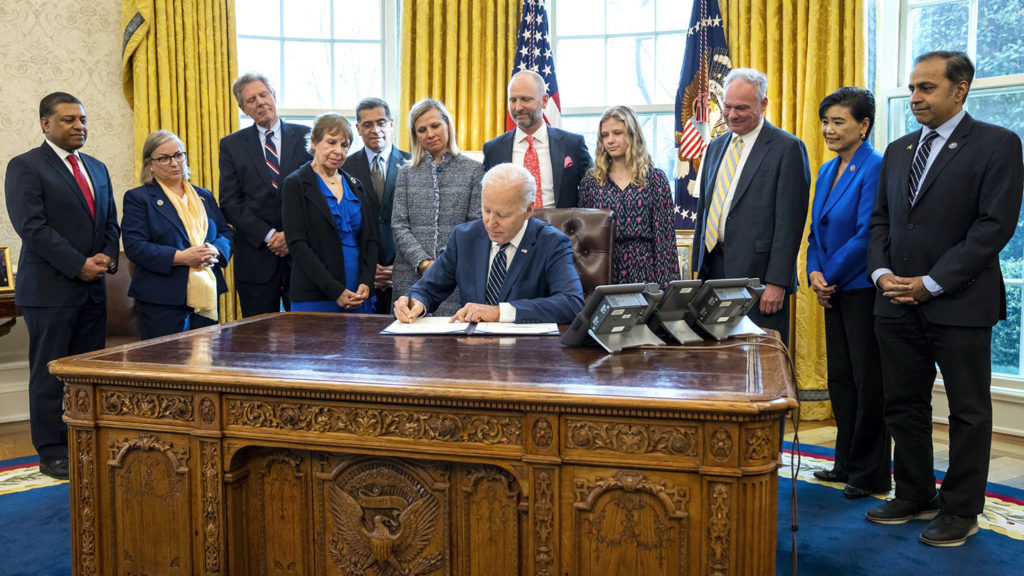
A bipartisan bill signed into law Friday by President Biden aims to reduce and prevent suicide, burnout, mental health and behavioral health conditions among healthcare professionals.
The Dr. Lorna Breen Health Care Provider Protection Act is named for an emergency department physician who died by suicide two years ago while serving on the front lines of the COVID-19 pandemic.
“The mental health consequences of COVID-19 are particularly acute for our frontline health care healers, who’ve made tremendous sacrifices to care for their patients in uncharted times,” Sen. Tim Kaine (D-VA), who introduced the legislation, said in a statement after the signing ceremony. “This bill is a critical first step to provide them with mental health resources to cope with the challenges they face every day. Supporting our healthcare workforce will benefit everyone because we all need great medical professionals to take care of us and our loved ones. By keeping our healthcare professionals healthy, everyone in society wins.”
Specifically, the Dr. Lorna Breen Health Care Provider Protection Act will:
- Establish grants for healthcare providers and professional associations for employee education, peer-support programming and mental and behavioral health treatment. Healthcare providers in current or former COVID-19 hotspots will be prioritized.
- Establish grants for health profession schools, academic health centers and other institutions to help them train health workers in strategies to prevent suicide, burnout, mental health conditions and substance use disorders. The grants also are meant to help improve healthcare professionals’ well-being and job satisfaction.
- Seek to identify and disseminate evidence-informed best practices for reducing and preventing suicide and burnout among healthcare professionals, training healthcare professionals in appropriate strategies and promoting their mental and behavioral health and job satisfaction.
- Establish a national evidence-based education and awareness campaign targeting healthcare professionals to encourage them to seek support and treatment for mental and behavioral health concerns.
- Establish a comprehensive study on healthcare professionals’ mental and behavioral health and burnout, including the effects of the COVID-19 pandemic on such professionals’ health.
“We applaud Congress and the administration for these newly created resources aimed to promote mental and behavioral health among the front-line staff, especially those who cared for the residents in senior living communities who were most at risk for COVID-19 infection,” American Seniors Housing Association President David Schless told McKnight’s Senior Living. “The toll such stress has taken on the workforce cannot be overstated, and this program will offer a valuable option for those companies that wish to pursue these available grants. ASHA will promote the availability of these funds to our members.”
The American Health Care Association / National Center for Assisted Living also told McKnight’s Senior Living that the organizations would be “encouraging our members to take advantage of these grants.”
“The pandemic has taken an emotional and physical toll on our caregivers, and any resources offered to help with mental health and wellness is welcome news. Burnout is a huge concern, especially as many long-term caregivers have felt forgotten or blamed for a vicious virus that uniquely targeted the elderly,” AHCA / NCAL said in a statement.
Some provisions modeled after the Dr. Lorna Breen Health Care Provider Protection Act were funded by the American Rescue Plan Act, COVID-19 relief legislation signed into law in March 2021, but Kaine said the full bill was needed to authorize all of its provisions and provide more direction on how the money should be spent.
The legislation passed in the Senate Feb. 18 after having passed in the House Dec. 8.
Kaine was joined in introducing the legislation by Sens. Bill Cassidy, M.D. (R-LA), Jack Reed (D-RI) and Todd Young (R-IN) as well as Reps. Judy Chu (D-CA), Raja Krishnamoorthi (D-IL), David McKinley (R-WV) and Susan Wild (D-PA).



